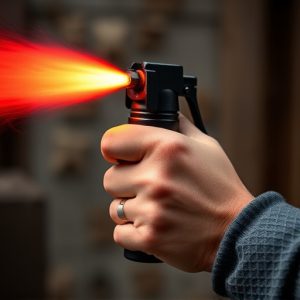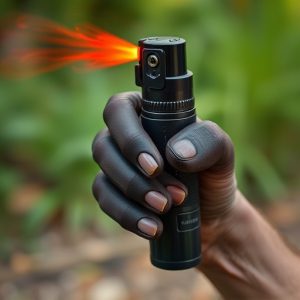Maximizing Pepper Spray Defense: Expiry Date & Effective Usage Strategies
TL;DR: Pepper spray, a non-lethal self-defense tool using capsaicin, requires regular maintenance, e…….
TL;DR: Pepper spray, a non-lethal self-defense tool using capsaicin, requires regular maintenance, especially checking expiration dates. After 2-3 years or earlier due to degradation, pepper spray loses potency. Expired spray reduces effectiveness against attackers' eyes and respiratory systems. Staying informed about expiration dates and practicing application techniques ensures its reliability as a personal defense mechanism.
“In today’s unpredictable world, understanding self-defense mechanisms is paramount. One such tool gaining popularity for its effectiveness and accessibility is pepper spray. This article delves into the intricate details of pepper spray as a deterrent, exploring its basic concepts and role in personal safety. We’ll dissect the importance of regularly checking the expiration date, addressing common myths, and providing strategic usage tips to ensure its maximum potential as your defense mechanism.”
- Understanding Pepper Spray: The Basic Concepts and its Role in Self-Defense
- Why Check the Expiration Date? The Science Behind Pepper Spray's Efficacy
- Unraveling Common Myths: Debunking Misconceptions About Pepper Spray
- Effective Usage Strategies: Maximizing the Potential of Your Pepper Spray Defense
Understanding Pepper Spray: The Basic Concepts and its Role in Self-Defense
Pepper spray is a non-lethal self-defense tool that uses capsaicin, the chemical compound found in hot peppers, to cause temporary disorientation and pain. When deployed, it creates a cloud of oily aerosol that irritates the eyes, nose, and respiratory system, making it difficult for an assailant to see, breathe, or move effectively. This simple yet powerful mechanism provides individuals with a critical defense option, especially in close-quarters encounters.
Regularly checking the pepper spray’s expiration date is essential as its effectiveness diminishes over time. Unlike some self-defense tools that require proper training and technique, pepper spray offers an immediate response, making it accessible to people from all walks of life. Its convenience should not be overshadowed by the need for maintenance; a simple visual inspection can reveal signs of wear or damage, while checking the expiration date ensures you have a reliable defense mechanism when it matters most.
Why Check the Expiration Date? The Science Behind Pepper Spray's Efficacy
Checking the expiration date on pepper spray is a crucial step in ensuring its effectiveness as a self-defense mechanism. Pepper spray, like any chemical agent, has a limited lifespan and degrades over time, losing its potency. The expiration date indicates when the spray will reach its peak strength and quality, beyond which its performance cannot be guaranteed. This is because the active ingredients in pepper spray, primarily capsaicin, can degrade due to exposure to heat, light, and air, rendering it less potent against potential threats.
The science behind pepper spray’s efficacy revolves around the irritant properties of capsaicin. When sprayed, it targets the eyes, nose, and respiratory system, temporarily disabling an attacker by causing severe pain, tearing, coughing, and difficulty breathing. However, as pepper spray ages, the concentration of capsaicin decreases, leading to a reduced impact. Regularly checking and replacing expired pepper spray ensures that you have a reliable defense mechanism when facing dangerous situations, guaranteeing its ability to disrupt and incapacitate an assailant.
Unraveling Common Myths: Debunking Misconceptions About Pepper Spray
Many myths and misconceptions surround pepper spray, a popular personal defense mechanism. One of the most common is that it’s a permanent blinder. In reality, pepper spray temporarily incapacitates an assailant by irritating their eyes and respiratory system, allowing you to escape safely. It does not cause blindness or permanent damage.
Another prevalent myth is that pepper spray never expires. However, just like any other product, it does have a shelf life. Regularly checking the expiration date on your pepper spray unit is essential. Most brands recommend replacing it after 2-3 years to ensure maximum effectiveness. This simple step can make a significant difference in its performance when you need it most. Remember, staying informed about these myths helps in understanding how to use pepper spray as a reliable defense mechanism.
Effective Usage Strategies: Maximizing the Potential of Your Pepper Spray Defense
Maximizing the effectiveness of pepper spray as a deterrent requires a strategic approach. One crucial strategy is to stay informed about its expiration date—a common oversight that can render your defense mechanism useless. Regularly checking and maintaining an up-to-date supply ensures you’re prepared when facing potential threats. It’s not just about having pepper spray; it’s about using it wisely.
Additionally, understanding the ideal application techniques is paramount. Aiming for the eyes is a common tactic, but training in wind conditions and proximity to ensure optimal coverage can significantly enhance its effectiveness. Practicing these skills regularly prepares you to respond calmly and confidently when facing dangerous situations, making your pepper spray a reliable defense tool.
In understanding and utilizing pepper spray as a deterrent for self-defense, checking the expiration date is paramount. The science behind its efficacy demands regular maintenance, ensuring its potency remains effective. By debunking common myths and adopting strategic usage methods, individuals can maximize the potential of their pepper spray defense. Remember, staying informed and prepared are key to navigating potentially dangerous situations with confidence.


